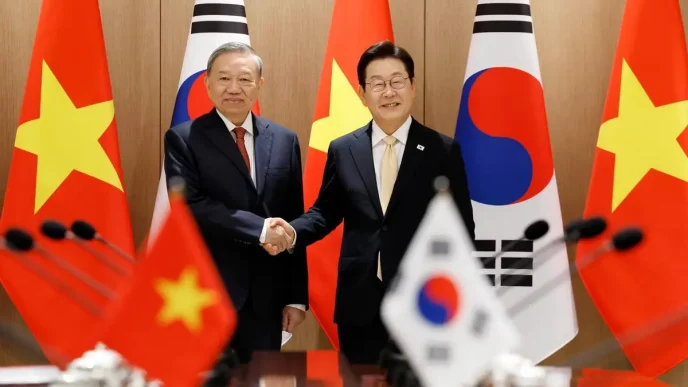Jakarta and Kuala Lumpur are navigating a delicate path of diplomacy to address the decades-old dispute over the Ambalat maritime region, a resource-rich area off the northeastern coast of Borneo. The overlapping claims, recently reignited by Malaysia’s reassertion of sovereignty, have prompted both nations to emphasize peaceful negotiations while exploring joint economic cooperation in the contested zone.
A Long-Standing Maritime Dispute
The Ambalat region, spanning 15,235 square kilometers near the maritime border between Indonesia’s North Kalimantan and Malaysia’s Sabah state, has been a point of contention since Malaysia staked a claim in 1979 through a territorial map. Indonesia, citing a colonial-era agreement from 1891 and the 1969 Indonesia-Malaysia Continental Shelf Boundary Treaty, maintains that Ambalat falls within its sovereign territory. Malaysia, however, refers to the area as blocks ND6 and ND7, asserting it as part of the Sulawesi Sea within its jurisdiction.
The dispute gained further complexity after the International Court of Justice awarded the nearby islands of Sipadan and Ligitan to Malaysia in 2002, a ruling that Malaysian Foreign Minister Mohamad Hasan recently referenced to bolster Kuala Lumpur’s position. Speaking to the lower house of parliament on August 6, 2025, Mohamad urged lawmakers to use the term “Laut Sulawesi” instead of Ambalat, aligning with Malaysia’s territorial stance. He also stressed a commitment to peaceful resolution, noting the overwhelmingly positive relationship with Indonesia and a desire to avoid conflict over the issue.
Indonesia, for its part, has consistently advocated for diplomacy. Foreign Minister Sugiono, addressing reporters on August 9, 2025, affirmed that the matter would be “resolved amicably, peacefully through diplomacy” as reported by local media. This sentiment was echoed by Abdul Kadir Jaelani, the director general for Asia-Pacific and African affairs at Indonesia’s Foreign Ministry, who highlighted the nation’s adherence to ASEAN principles of peaceful conflict resolution.
President Prabowo Subianto, speaking on August 8, 2025, reiterated the government’s pursuit of a non-confrontational approach, acknowledging goodwill from both sides. This unified stance from Indonesian leadership underscores a broader regional commitment to stability, especially within the framework of ASEAN, where dialogue often takes precedence over escalation.
Joint Development as a Pragmatic Interim Solution
Amidst ongoing territorial negotiations, a potential pathway for cooperation has emerged through a joint development agreement. During a visit to Jakarta in June 2025, Malaysian Prime Minister Anwar Ibrahim and President Prabowo announced plans to collaboratively explore and exploit natural resources in Ambalat. Prabowo described the initiative as joint development emphasizing that both nations would share the benefits of maritime resources while legal matters surrounding the boundary remain unresolved.
Anwar, in turn, noted that delaying economic cooperation due to unresolved borders would be unwise, signaling a mutual interest in prioritizing economic gains over prolonged territorial disputes. Although the plan remains in an exploratory phase as of August 2025, it reflects a pragmatic approach to managing a complex issue that could otherwise strain bilateral ties.
International law experts in Indonesia have endorsed this strategy as a viable interim measure. Aristyo Darmawan, a scholar at the University of Indonesia, explained on August 10, 2025, that such arrangements are permissible under the United Nations Convention on the Law of the Sea (UNCLOS), which allows countries to pursue joint development without prejudicing ongoing boundary negotiations. He described the move as a pragmatic step toward stability and mutual economic benefit, predicting that the dispute is unlikely to escalate given the shared commitment to cooperation.
Similarly, Hikmahanto Juwana, another international law professor at the University of Indonesia, called the joint development agreement a reasonable solution. He noted that neither side is likely to relinquish its claim over the continental shelf boundary, suggesting that the dispute could persist indefinitely. However, by focusing on shared resource exploitation rather than leaving the area untapped, both nations can sidestep immediate conflict over the maritime border.
Historical Context and Regional Implications
The Ambalat dispute is rooted in historical ambiguities over colonial-era boundaries on Borneo, an island shared by Indonesia, Malaysia, and Brunei. The 1891 agreement between Dutch and British colonial authorities initially placed Ambalat within Indonesian territory, a position later reinforced by the 1969 treaty delineating the continental shelf boundary. Malaysia’s 1979 map, however, challenged this understanding, triggering tensions that extended to nearby Sipadan and Ligitan—islands ultimately awarded to Malaysia by international arbitration.
This historical backdrop complicates current negotiations, as both nations draw on legal precedents and historical claims to justify their positions. Malaysia’s reference to the 2002 ICJ ruling as a basis for its claim over Ambalat contrasts with Indonesia’s insistence on earlier treaties, creating a legal impasse that may require years, if not decades, to resolve fully. Yet, the absence of militarized rhetoric from either side suggests a shared recognition of the costs of escalation, particularly in a region where economic interdependence and ASEAN solidarity remain paramount.
Beyond bilateral relations, the Ambalat dispute carries implications for ASEAN’s broader cohesion. The organization, which both Indonesia and Malaysia are founding members of, has long championed peaceful dispute resolution as a cornerstone of regional stability. The ongoing dialogue over Ambalat, coupled with the joint development proposal, serves as a test case for ASEAN’s ability to mediate internal disagreements without external intervention. Success in this endeavor could reinforce the bloc’s relevance in managing maritime disputes, especially as tensions over the South China Sea continue to loom large over Southeast Asia.
Navigating Nomenclature and National Pride
One of the more subtle but symbolically significant aspects of the Ambalat dispute is the disagreement over nomenclature. Malaysia’s insistence on referring to the area as “Laut Sulawesi” rather than Ambalat reflects a broader assertion of sovereignty through language, a move that has not gone unnoticed in Jakarta. While Indonesian officials and experts continue to use “Ambalat” in official discourse, the differing terminology underscores the deeper challenge of reconciling national narratives around territorial identity.
Aristyo Darmawan suggested that Indonesia should persist in using its preferred name during negotiations, viewing the naming issue as a common point of friction between neighboring states. This linguistic divide, while unlikely to derail diplomatic efforts, highlights the emotional and cultural dimensions of maritime disputes, where national pride often intersects with geopolitical strategy.
Economic Stakes in a Resource-Rich Region
The Ambalat region’s appeal lies in its untapped natural resources, believed to include significant oil and gas reserves. For both Indonesia and Malaysia, securing access to these resources could bolster energy security and economic growth, particularly in border regions like North Kalimantan and Sabah, where development disparities persist. The joint development agreement, if implemented, could serve as a model for balancing economic imperatives with territorial sensitivities, potentially yielding billions in revenue while negotiations over sovereignty continue.
However, the exploratory nature of the current plan means that concrete outcomes remain uncertain. Technical challenges, such as delineating resource-sharing mechanisms and ensuring equitable benefits, could complicate the initiative. Moreover, domestic political pressures in both countries may influence the pace and direction of cooperation, as leaders balance national interests with the need for regional harmony.
A Path Forward Amidst Uncertainty
As Indonesia and Malaysia chart a course toward resolving the Ambalat dispute, their commitment to diplomacy offers a hopeful counterpoint to more contentious maritime conflicts in Southeast Asia. The joint development proposal, while still in its infancy, represents a forward-thinking approach to resource management in disputed areas, aligning with international legal frameworks like UNCLOS and ASEAN’s cooperative ethos.
Yet, the road ahead is far from straightforward. Legal, economic, and symbolic dimensions of the dispute will require sustained dialogue and compromise, testing the resilience of bilateral ties. For now, the absence of escalatory rhetoric and the focus on peaceful means provide a foundation for progress, even as the ultimate resolution of Ambalat’s status remains an open question. As negotiations unfold, the region watches closely, aware that the outcome could shape not only Indonesia-Malaysia relations but also the broader dynamics of maritime governance in ASEAN.















